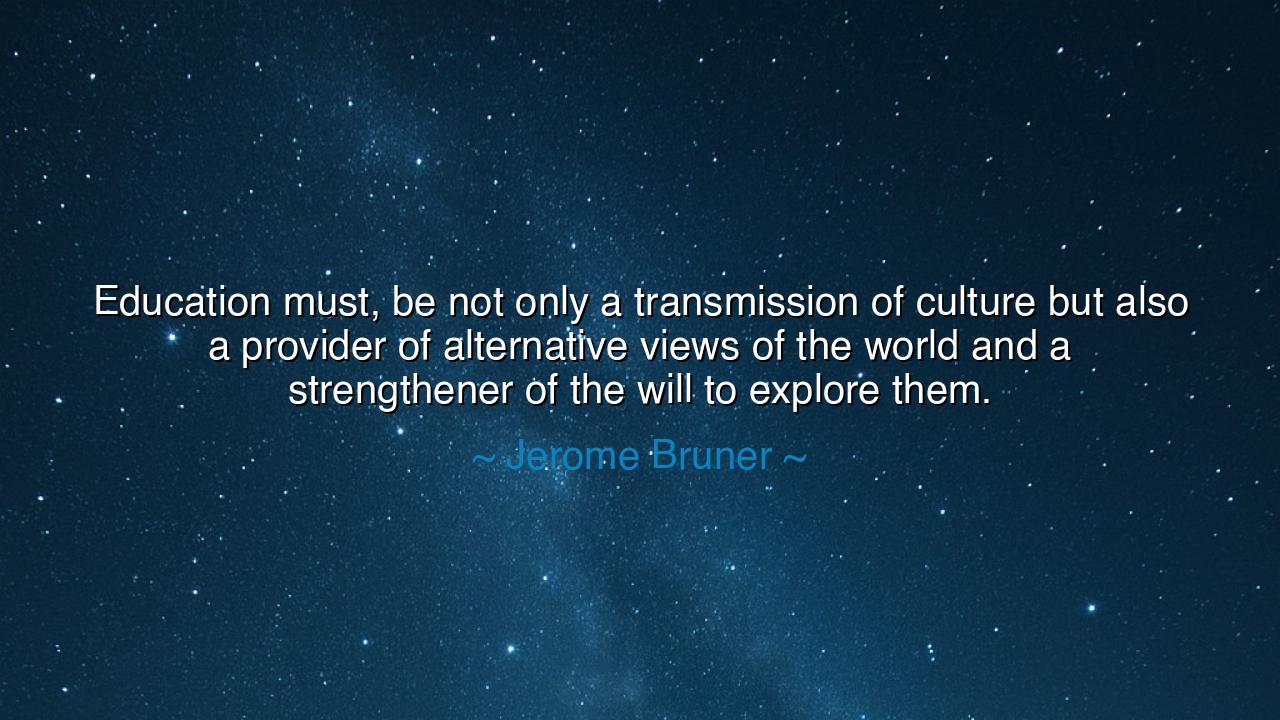
Education must, be not only a transmission of culture but also a
Education must, be not only a transmission of culture but also a provider of alternative views of the world and a strengthener of the will to explore them.






Hear the words of Jerome Bruner, who proclaimed: “Education must, be not only a transmission of culture but also a provider of alternative views of the world and a strengthener of the will to explore them.” This statement is not a mere suggestion, but a call to revolutionize the way we see learning. For Bruner saw that education is not simply a vessel to carry the past into the future—it is also a fire that lights the unknown, giving courage to step beyond the familiar and gaze upon possibilities unimagined.
The phrase “transmission of culture” holds deep weight. For every people, every nation, every family passes down songs, stories, customs, and truths that shape identity. Without such transmission, there is no continuity, no memory of who we are. But Bruner warns that if education does only this—if it only repeats, if it only preserves—it becomes a cage, locking children in the patterns of yesterday. To truly educate is to honor the past, but also to fling open windows to new horizons.
The heart of Bruner’s vision is in the words “alternative views of the world.” What power lies in this! For the mind that knows only one vision is narrow, but the mind that has seen many becomes vast, compassionate, and free. This is why the study of different cultures, philosophies, and sciences is essential. A student taught only their own tradition may walk a narrow road. But one who is taught to compare, to imagine, to see the world through other eyes, becomes a traveler of many paths, unafraid to challenge what is and dream of what might be.
Consider the tale of Galileo. He was raised in a world where the heavens were believed fixed and perfect, the Earth unmoving at the center of creation. Yet his education was not mere repetition of old truths—it gave him the strength of will to explore alternative views. He looked through his telescope and declared that the Earth was not the center, but a planet among planets. For this, he was condemned, yet his courage reshaped the very vision of humanity. His life is proof of Bruner’s teaching: that true education must empower us to see differently, and to stand firm in seeking truth even when the world resists.
History shows us the opposite as well. When learning is reduced only to preservation, societies stagnate. Dynasties that forbade new thought or burned books to silence ideas crumbled into dust. Their culture survived only as relics, not as living flames. But those civilizations that embraced exploration—Athens in philosophy, the Renaissance in art and science, the Enlightenment in reason—grew strong, birthing revolutions of thought that still shape us today.
Thus, the lesson is clear: education is a dual duty. It must teach us where we come from, and also give us courage to seek where we might go. It must anchor us in culture, yet set sails toward new worlds of possibility. Without the anchor, we drift without identity. Without the sail, we remain chained to the harbor. Both are needed, for both are sacred.
What, then, should you do? If you are a student, do not be content only to receive what is given—question, compare, imagine. If you are a teacher, pass down the wisdom of the past, but also awaken the will to explore, to challenge, to grow. If you are a parent or a leader, support learning that honors tradition but embraces innovation. Create spaces where young minds may see the world not only as it is, but as it might yet be.
So remember Bruner’s words: education must be more than inheritance; it must be exploration. Teach the old songs, yes, but let the children compose new ones. Share the wisdom of the ancestors, but let the youth gaze at the stars with fresh eyes. For in the balance of culture and alternative views, in the harmony of memory and discovery, lies the true power of learning—the power to shape a world both rooted in its past and unafraid of its future.






AAdministratorAdministrator
Welcome, honored guests. Please leave a comment, we will respond soon